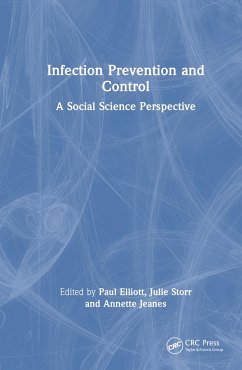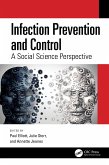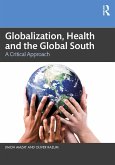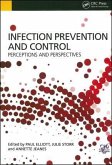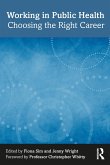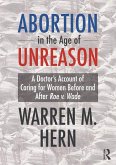Infection Prevention and Control
A Social Science Perspective
Herausgeber: Jeanes, Annette; Elliott, Paul; Storr, Julie
Infection Prevention and Control
A Social Science Perspective
Herausgeber: Jeanes, Annette; Elliott, Paul; Storr, Julie
- Gebundenes Buch
- Merkliste
- Auf die Merkliste
- Bewerten Bewerten
- Teilen
- Produkt teilen
- Produkterinnerung
- Produkterinnerung
This new book positions the specialty of IPC as more than a technical discipline concerned with microbes. It is about people and their behaviour in context and the book therefore explores a number of relevant social sciences and their relationship to IPC across different contexts and cultures.
Andere Kunden interessierten sich auch für
![Infection Prevention and Control Infection Prevention and Control]() Infection Prevention and Control68,99 €
Infection Prevention and Control68,99 €![Globalization, Health and the Global South Globalization, Health and the Global South]() Jimoh AmzatGlobalization, Health and the Global South69,99 €
Jimoh AmzatGlobalization, Health and the Global South69,99 €![Mad Studies Reader Mad Studies Reader]() Mad Studies Reader91,99 €
Mad Studies Reader91,99 €![Infection Prevention and Control Infection Prevention and Control]() Infection Prevention and Control52,99 €
Infection Prevention and Control52,99 €![Eggonomics Eggonomics]() Diane M. ToberEggonomics17,99 €
Diane M. ToberEggonomics17,99 €![Working in Public Health Working in Public Health]() Working in Public Health40,99 €
Working in Public Health40,99 €![Abortion in the Age of Unreason Abortion in the Age of Unreason]() Warren M. HernAbortion in the Age of Unreason33,99 €
Warren M. HernAbortion in the Age of Unreason33,99 €-
-
-
This new book positions the specialty of IPC as more than a technical discipline concerned with microbes. It is about people and their behaviour in context and the book therefore explores a number of relevant social sciences and their relationship to IPC across different contexts and cultures.
Hinweis: Dieser Artikel kann nur an eine deutsche Lieferadresse ausgeliefert werden.
Hinweis: Dieser Artikel kann nur an eine deutsche Lieferadresse ausgeliefert werden.
Produktdetails
- Produktdetails
- Verlag: Taylor & Francis Ltd
- Seitenzahl: 204
- Erscheinungstermin: 1. Juni 2023
- Englisch
- Abmessung: 160mm x 242mm x 18mm
- Gewicht: 516g
- ISBN-13: 9781032459448
- ISBN-10: 1032459441
- Artikelnr.: 67258751
- Herstellerkennzeichnung
- Libri GmbH
- Europaallee 1
- 36244 Bad Hersfeld
- gpsr@libri.de
- Verlag: Taylor & Francis Ltd
- Seitenzahl: 204
- Erscheinungstermin: 1. Juni 2023
- Englisch
- Abmessung: 160mm x 242mm x 18mm
- Gewicht: 516g
- ISBN-13: 9781032459448
- ISBN-10: 1032459441
- Artikelnr.: 67258751
- Herstellerkennzeichnung
- Libri GmbH
- Europaallee 1
- 36244 Bad Hersfeld
- gpsr@libri.de
Paul Elliott Paul commenced his initial nurse education in 1971 at Royal Air Force Hospital Ely, Cambridgeshire. Following this Paul undertook a number of post qualification courses. Following retirement from the Royal Air Force in 1985 Paul entered the National Health Service initially undertaking some further nurse education with the Burton upon Trent School of Nursing, Staffordshire. Following this he spent the next few years working in the accident and emergency/medical admissions settings before moving into higher education in 1991 with his current appointment being as a Senior Lecturer in Adult Nursing with Canterbury Christ Church University, Kent. Since entering higher education Paul's primary research interests, publications and conference papers have centred around the psychosocial aspects of infection prevention and control. Julie Storr Julie is an MBA graduate and graduate nurse from the University of Manchester, where she also trained as a Health Visitor. She is co-founder and director at S3 Global and has worked internationally since 2005, predominantly as an expert with World Health Organisation (WHO) on the development, implementation and evaluation of initiatives in the field of patient safety, quality and infection prevention and control (IPC). Annette Jeanes Annette Jeanes is an independent Consultant Infection Control Nurse. She was the Infection Control lead at the Nightingale Hospital in London for the duration of the initial and subsequent London Covid-19 response. Prior to that Annette worked in the NHS as the Director of Infection Prevention & Control and Consultant Nurse Infection Control at University College London Hospitals. She has worked at several London hospitals in Infection Control, intensive care, infectious diseases, medicine and surgery. She has undertaken and published research in improving hand hygiene compliance and hospital cleaning.
Part 1: Psychosocial Perspectives Chapter 1: Psychosocial theories and
approaches: Their impact upon infection prevention and control Chapter 2:
The psychosocial nature of infection prevention and control Chapter 3: The
concept of truth Part 2: Leadership Perspectives Chapter 4: Leadership and
influence in infection prevention and control Chapter 5: Power and
compliance within infection prevention and control practice Chapter 6:
Patient safety, governance, leadership and infection prevention and control
Chapter 7: Communicating with compassion: service user perspectives Chapter
8: The weaponising of IPC and its heart breaking consequences Chapter 9:
Why do we choose to work in infection prevention and control? Part 3: Real
world perspectives Chapter 10: Human factors engineering in infection
prevention and control Chapter 11: How we talk about infection prevention
and hand hygiene matters for behaviour change Chapter 12: Do campaigns make
you anxious: A focus on unintended consequences Chapter 13: Educating,
engaging, campaigning - social media as an adjunct to infection prevention
and control Chapter 14: Unshackling infectiousness and dismantling stigma:
Gay men and HIV Chapter 15: Physician Associates and their role in reducing
the transmission of infection - a personal perspective Chapter 16:
Infection prevention and control in healthcare-built environments Chapter
17: Musings on philosophy and infection prevention and control
approaches: Their impact upon infection prevention and control Chapter 2:
The psychosocial nature of infection prevention and control Chapter 3: The
concept of truth Part 2: Leadership Perspectives Chapter 4: Leadership and
influence in infection prevention and control Chapter 5: Power and
compliance within infection prevention and control practice Chapter 6:
Patient safety, governance, leadership and infection prevention and control
Chapter 7: Communicating with compassion: service user perspectives Chapter
8: The weaponising of IPC and its heart breaking consequences Chapter 9:
Why do we choose to work in infection prevention and control? Part 3: Real
world perspectives Chapter 10: Human factors engineering in infection
prevention and control Chapter 11: How we talk about infection prevention
and hand hygiene matters for behaviour change Chapter 12: Do campaigns make
you anxious: A focus on unintended consequences Chapter 13: Educating,
engaging, campaigning - social media as an adjunct to infection prevention
and control Chapter 14: Unshackling infectiousness and dismantling stigma:
Gay men and HIV Chapter 15: Physician Associates and their role in reducing
the transmission of infection - a personal perspective Chapter 16:
Infection prevention and control in healthcare-built environments Chapter
17: Musings on philosophy and infection prevention and control
Part 1: Psychosocial Perspectives Chapter 1: Psychosocial theories and
approaches: Their impact upon infection prevention and control Chapter 2:
The psychosocial nature of infection prevention and control Chapter 3: The
concept of truth Part 2: Leadership Perspectives Chapter 4: Leadership and
influence in infection prevention and control Chapter 5: Power and
compliance within infection prevention and control practice Chapter 6:
Patient safety, governance, leadership and infection prevention and control
Chapter 7: Communicating with compassion: service user perspectives Chapter
8: The weaponising of IPC and its heart breaking consequences Chapter 9:
Why do we choose to work in infection prevention and control? Part 3: Real
world perspectives Chapter 10: Human factors engineering in infection
prevention and control Chapter 11: How we talk about infection prevention
and hand hygiene matters for behaviour change Chapter 12: Do campaigns make
you anxious: A focus on unintended consequences Chapter 13: Educating,
engaging, campaigning - social media as an adjunct to infection prevention
and control Chapter 14: Unshackling infectiousness and dismantling stigma:
Gay men and HIV Chapter 15: Physician Associates and their role in reducing
the transmission of infection - a personal perspective Chapter 16:
Infection prevention and control in healthcare-built environments Chapter
17: Musings on philosophy and infection prevention and control
approaches: Their impact upon infection prevention and control Chapter 2:
The psychosocial nature of infection prevention and control Chapter 3: The
concept of truth Part 2: Leadership Perspectives Chapter 4: Leadership and
influence in infection prevention and control Chapter 5: Power and
compliance within infection prevention and control practice Chapter 6:
Patient safety, governance, leadership and infection prevention and control
Chapter 7: Communicating with compassion: service user perspectives Chapter
8: The weaponising of IPC and its heart breaking consequences Chapter 9:
Why do we choose to work in infection prevention and control? Part 3: Real
world perspectives Chapter 10: Human factors engineering in infection
prevention and control Chapter 11: How we talk about infection prevention
and hand hygiene matters for behaviour change Chapter 12: Do campaigns make
you anxious: A focus on unintended consequences Chapter 13: Educating,
engaging, campaigning - social media as an adjunct to infection prevention
and control Chapter 14: Unshackling infectiousness and dismantling stigma:
Gay men and HIV Chapter 15: Physician Associates and their role in reducing
the transmission of infection - a personal perspective Chapter 16:
Infection prevention and control in healthcare-built environments Chapter
17: Musings on philosophy and infection prevention and control

